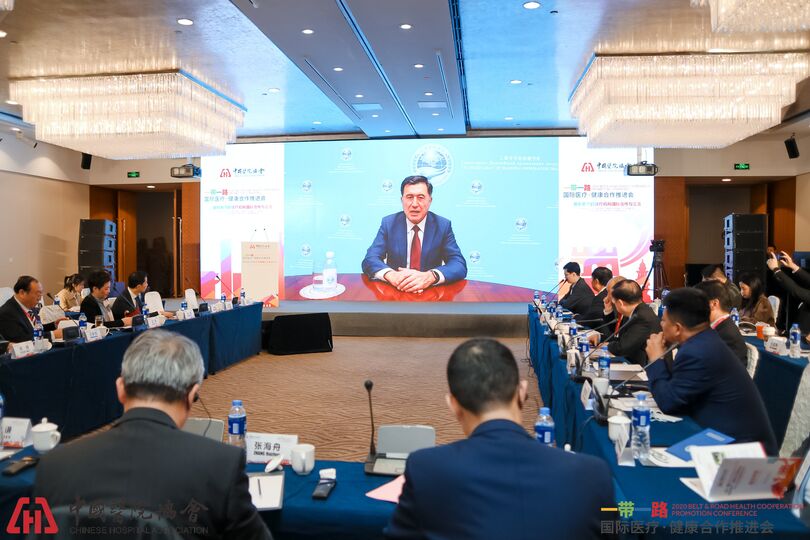On 23 October 2020, the Chinese Hospital Association held the International Conference for Healthcare Cooperation in Nanjing, China, on the topic "International innovative cooperation and sharing best practices in healthcare in the era of globalisation."
The event was set up as a platform for sharing best practices on the prevention of infectious diseases and management in a globalised world, as well as promoting cooperation on innovative medical technology.
SCO Secretary-General Vladimir Norov sent a video message to the conference participants.
Representatives of Chinese government agencies, international organisations, experts, researchers and members of the academia also took part in the conference.
Vice-President of the Chinese Hospital Association Fang Laiying, Chairman of the Northern Jiangsu People's Hospital Association Wang Jinsheng and Director at the Shanghai Pharmaceuticals Administration Wen Dayan acted as the event's moderators.
In his video message, the SCO Secretary-General said that the event's topic was front and centre for the entire international community, considering the ongoing efforts to fight the coronavirus pandemic.
Mr Norov praised the Chinese leadership for taking swift, decisive and effective measures to limit the spread of the disease and overcome the consequences of the epidemic. He emphasised that by adopting a centralised, knowledge-based, proactive, effective and targeted approach, China had succeeded in greatly minimising the threat of the epidemic and had avoided the second wave. China's advances in artificial intelligence and big data played an important role in achieving these results.
The SCO Secretary-General also praised healthcare institutions across China for their efforts to supply medical equipment and medicine, as well as for sending more than 40,000 medical workers to Hubei Province, who demonstrated courage and heroism in fulfilling their duties.
In his statement, Mr Norov also said that guided by the SCO spirit, member states demonstrated a high level of solidarity and mutual support in the fight against the coronavirus epidemic. "In the first days of the epidemic, the SCO heads of state voiced their unconditional support for China's efforts by sending medicine, medical equipment and PPE. China in turn offered the necessary assistance to the SCO countries, including medicine, medical equipment and PPE, as well as by sending doctors," the SCO Secretary-General pointed out.
In this context, Mr Norov said that the SCO Heads of State Summit, scheduled to take place on 10 November 2020, is expected to approve the Comprehensive Joint Action
Plan to counter the threats of epidemics in the region, as well as a Statement by SCO Member States on Joint Efforts to Counter the Novel Coronavirus.
At the same time, he drew the participants' attention to the fact that the ongoing crisis is rooted in cross-border risks, the importance of which has long been ignored as a threat to human livelihoods.
In conclusion, Mr Norov noted China's considerable cutting-edge capabilities in medical technology for assisting other countries in their fight against the COVID-19 pandemic, and proposed discussing the creation of an online healthcare cooperation platform to promote contacts and cooperation between SCO medical clinics. "This mechanism creates opportunities for connecting hospitals and clinics as a platform for holding consultations, sharing best practices, technology and achievements in fighting the pandemic, including telemedicine solutions," he said in his video message.
The conference included presentations given by a number of experts representing various branches of China's healthcare sector on promoting innovative medical cooperation with foreign clinics and hospitals.
Responding to the SCO Secretary-General's proposal, Chairman of the SCO Hospital Cooperation Alliance Wen Hao said that creating an online platform would be a timely initiative to promote cooperation on healthcare among countries involved in the Belt and Road Initiative. He went on to propose setting up an expert working group to explore this opportunity.
Representative of the China's National Health Commission, Shao Meng, also responded to Mr Norov's proposals by saying that the Chinese Hospital Association has already created a cooperation platform of this kind that includes India, Iraq, Indonesia, Nepal, Mongolia, Bulgaria, Greece and Spain. It hosts online meetings, consultations and experience sharing sessions. China is ready to discuss inviting the SCO countries to join this framework.
Vice-President of Renji Hospital affiliated to Shanghai JiaoTong University School of Medicine, Wang Yu, said that clinics and hospitals could benefit from international cooperation by sharing best practices. However, this required creating the necessary conditions for developing international cooperation. He also highlighted the need to discuss the technological aspects related to uploading and sharing data through the online cooperation platform.
Vice-President of the Chinese Hospital Association Fang Laiying noted the importance of international cooperation on healthcare, stressing that China is ready to assist other countries by sharing innovative approaches and knowledge.
Overall, the participants concluded that COVID-19 could be defeated only through international cooperation, with China emphasising the importance of a mutually beneficial practical approach.
